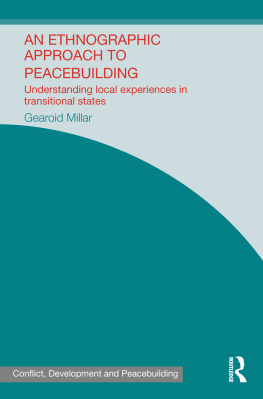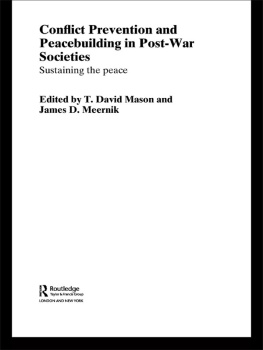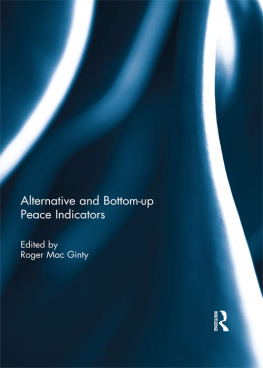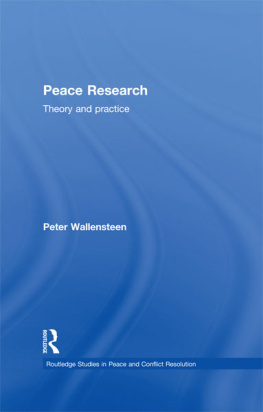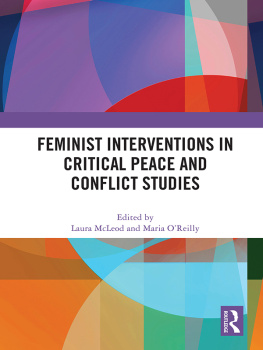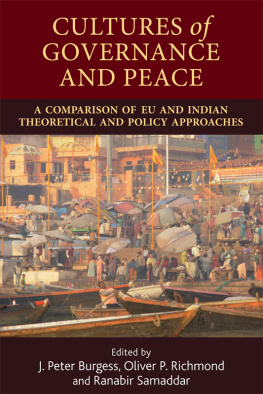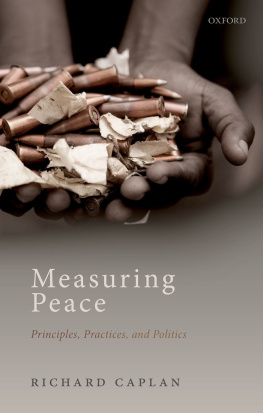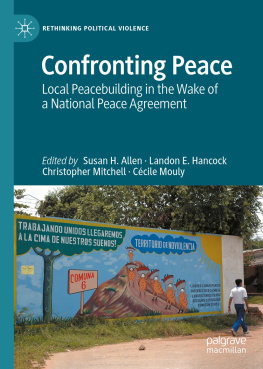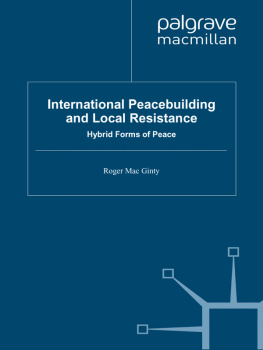
Engaging Ethnographic Peace Research
While many have argued in the past decade that peace and conflict studies must engage more with local actors and communities, and scholars regularly describe the importance of local context and culture for building sustainable peace, there are substantial challenges methodologically to fulfilling this local turn. Many peace and conflict studies scholars are inexperienced with methods appropriate for engaging with local communities, contexts, and cultures, and many of the important institutions in the field, from key journals to important funders, exhibit a continuing preference for quantitative studies.
The Ethnographic Peace Research (EPR) agenda has recently been developed in response to these challenges and is one of the key avenues to providing a methodological complement to the more theoretically focused local turn literature. This volume explores the application of the EPR approach in a number of post- conflict and conflict-affected societies around the world. While some chapters take a largely theoretical approach, most consider the practical application and the different kinds of methods that may be useful components of an EPR project. Together, the authors provide new insights into the benefits, challenges, and ethics of the emerging EPR agenda.
This book was originally published as a special issue of the journal International Peacekeeping.
Gearoid Millar is a Senior Lecturer of Sociology at the University of A berdeen, UK. He studies the local experiences of international interventions for peace, justice, and development in post-conflict societies. He has developed the Ethnographic Peace Research (EPR) approach through his research projects on Transitional Justice, Peacebuilding, and Development in Sierra Leone.
Engaging Ethnographic Peace Research
Edited by
GearoidMillar
First published 2019
by Routledge
2 Park Square, Milton Park, Abingdon, Oxon, OX14 4RN
and by Routledge
52 Vanderbilt Avenue, New York, NY 10017
Routledge is an imprint of the Taylor & Francis Group, an informa business
2019 Taylor & Francis
All rights reserved. No part of this book may be reprinted or reproduced or utilised in any form or by any electronic, mechanical, or other means, now known or hereafter invented, including photocopying and recording, or in any information storage or retrieval system, without permission in writing from the publishers.
Trademark notice: Product or corporate names may be trademarks or registered trademarks, and are used only for identification and explanation without intent to infringe.
British Library Cataloguing-in-Publication Data
A catalogue record for this book is available from the British Library
ISBN13: 978-0-367-23678-6
Typeset in Minion Pro
by codeMantra
Publisher's Note
The publisher accepts responsibility for any inconsistencies that may have arisen during the conversion of this book from journal articles to book chapters, namely the possible inclusion of journal terminology.
Disclaimer
Every effort has been made to contact copyright holders for their permission to reprint material in this book. The publishers would be grateful to hear from any copyright holder who is not here acknowledged and will undertake to rectify any errors or omissions in future editions of this book.
The chapters in this book were originally published in the journal International Peacekeeping, volume 25, issue 5 (February 2018). When citing this material, please use the original page numbering for each article, as follows:
Chapter 1
Introduction: Engaging Ethnographic Peace Research: Exploring an Approach
Gearoid Millar
International Peacekeeping, volume 25, issue 5 (February 2018) pp. 597609
Chapter 2
Visiting the Tiger Zone Methodological, Conceptual and Ethical Challenges of Ethnographic Research on Perpetrators
Timothy Williams
International Peacekeeping, volume 25, issue 5 (February 2018) pp. 610629
Chapter 3
With Soymilk to the Khmer Rouge: Challenges of Researching Ex-combatants in Post-war Contexts
Anne Hennings
International Peacekeeping, volume 25, issue 5 (February 2018) pp. 630652
Chapter 4
Ethnographic Peace Research: The Underappreciated Benefits of Long-term Fieldwork
Gearoid Millar
International Peacekeeping, volume 25, issue 5 (February 2018) pp. 653676
Chapter 5
Suspicion and Ethnographic Peace Research (Notes from a Local Researcher)
Nerve Valerio Macaspac
International Peacekeeping, volume 25, issue 5 (February 2018) pp. 677694
Chapter 6
Critiquing Anthropological Imagination in Peace and Conflict Studies: From Empiricist Positivism to a Dialogical Approach in Ethnographic Peace Research
Philipp Lottholz
International Peacekeeping, volume 25, issue 5 (February 2018) pp. 695720
For any permission-related enquiries please visit:
http://www.tandfonline.com/page/help/permissions
Anne Hennings is a Research Fellow at the University of Mnster, Germany. She researches social movements and contentious politics in post-war s ocieties with special emphasis on land conflicts. Based on extensive ethnographic fieldwork in Cambodia and Sierra Leone, she explores the risks of contested land deals for conflict transformation. She is co-founder and speaker of the working group Nature, Resources, Conflict and editor of the www.resources-and-conflict.org blog.
Philipp Lottholz is a Post-Doctoral Research Fellow at the DFG Collaborative Research Centre/Transregio 138 Dynamics of Security and the Institute of Sociology at Justus Liebig University of Giessen, Germany. His research interests include political sociology, critical peacebuilding studies, practice-based and action/activist methodology, international political economy, post-Socialist/post-Soviet studies, and postcolonial and decolonial international studies.
Nerve Valerio Macaspac is an Assistant Professor of Geography in the Department of Political Science and Global Affairs at the College of Staten Island at the City University of New York (CUNY), USA, where he teaches Geographic Information Systems (GIS) and Urban Geography. His research examines the maintenance of community-led demilitarized geographic areas, popularly known as peace zones, during armed conflict to better understand peace b eyond the dominant definition as absence of violence, and peacebuilding as a state-centric or expert-driven project of conflict resolution.
Gearoid Millar is a Senior Lecturer of Sociology at the University of Aberdeen, UK. He studies the local experiences of international interventions for peace, justice, and development in post-conflict societies. He has developed the Ethnographic Peace Research (EPR) approach through his research projects on Transitional Justice, Peacebuilding, and Development in Sierra Leone. He has published articles in the


